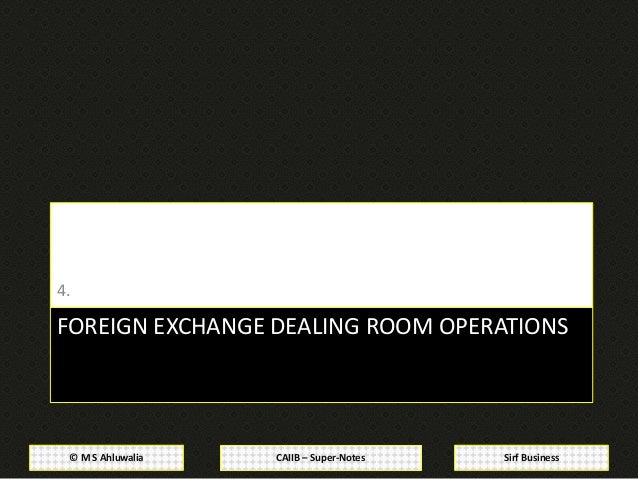Forex dealing room operations
Introduction The activities of a foreign-exchange dealing room, where world currencies are bought and sold, has actually changed very little over time. Indeed, the foreign-exchange market is very different from other financial markets, such as the bond or equity markets.
Trading takes place on one floor, and for the most part over the telephone, or on electronic screens. In this interview Charles Goodhart, Norman Sosnow Professor of Banking and Finance at the London School of Economics and Political Science, explains the inner workings of a foreign-exchange dealing room.
Can you explain how a foreign-exchange dealing room works? In a foreign-exchange dealing room there are a large number of traders, each of them sitting at a desk.
On these desks there are a number of computers with electronic screens. Each of the traders is trading, that is buying or selling, usually one foreign-exchange bilateral pair. By that I mean they are buying or selling pounds for dollars, or dollars for euros, or euros for yen, or dollars for yen. All the major currencies would be covered by the traders in the trading room, involving all the spot exchange rate and the forward and future exchange rates for the major currencies. In some cases there will be traders who deal with a number of smaller currencies, which are sometimes known as exotic currencies.
That is when you are dealing in, for example, the Malaysian ringgit or the Thai baht or the Korean won.
Karpuramanjari: Dealing Room Operations: Risks & Their Management
What is a vehicle currency and how do they work? Assume that you have a customer who wants to sell Norwegian krone and buy South African rand.
There is literally no market for doing that directly, as it would be extraordinarily illiquid. Each of the smaller currencies has quite a flourishing market with the US dollar, and in future will do so with the euro. If somebody wants to sell Norwegian krone to buy South African rand, he can sell the Norwegian krone for the dollar, and then use the dollar he has obtained to purchase the South African rand.
So he sells the dollar and buys rand.

In effect, he is going though the vehicle of the much more widely traded currency--i. Why would a dealer want to buy or sell foreign currency? Basically they are executing orders for their customers who want to buy or sell foreign currency either for trading purposes, for importers or exporters, or for investment purposes.
In addition to operating on behalf of customers, the trader will be operating on his own behalf, and when dealing for a customer he usually meets the customer's requirements out of his own inventory of that currency.
What are Foreign Exchange Dealing Room Operations? | hypufiyuyuq.web.fc2.com
He will then have to go into the market in order to rebalance his own inventory. So, the deals the trader makes are first of all for the customer and secondly to rebalance his own inventory, when a customer deal has unbalanced it.
Thirdly, if the trader takes a view about where a currency might go, he might deal on his own account thereby making a profit for a bank and a good bonus for himself--if he gets it right. Dealers get their information through a wide variety of routes.

The screens in front of them provide them with immediate, up-to-date electronic information from electronic information purveyors such as Reuters or Bloombergs.
In addition to that, which is continuously running, they can also telephone other traders to get up-to-date views about the current prices.
Live Trading - Inside Today's Forex Trading Room SessionThere are also inter-dealer brokers who may be prepared to offer quotes. Of course dealers, like everybody else, read the papers, journals and articles. So their knowledge comes from a combination of specialised information directed to them through the electronic screens, conversations with other people in the market and general background reading. Charles Goodhart explains how dealers ascertain if they have got the best price.
How does the dealer know if they have got the best price? First of all, the electronic screen displays the best price available at the moment.
In addition, you can actually telephone around to see if you can obtain a better price from a trader in another bank, who is also undertaking the same trading activity as you are.
Obviously, telephoning around takes time and other variables may change. However, the combination of telephone and the information from the electronic screen provides you with a pretty good chance of getting the best price. Has the kind of activity that goes on in a dealing room remained largely the same historically? Have the only significant changes to dealing rooms been brought about by technological advances?
hypufiyuyuq.web.fc2.com: DEALING ROOM OPERATIONS
The foreign-exchange market is really quite different from many other markets like the bond market or the equity market. For example, each trading bank in each centre has its own trading floor where the trading takes place, and trading was, until fairly recently, entirely conducted through the telephone. Increasingly, over the last ten years however, electronic screens and electronic-screen dealing, where you can actually deal electronically, has played a larger and larger role.
Forbidden
Nevertheless, the telephone still plays a part in the whole exercise. This video recording and transcript were taken from an interview held at the London School of Economics and Political Science on May 15, Dealing Rooms Charles Goodhart. How does a dealer stay informed?